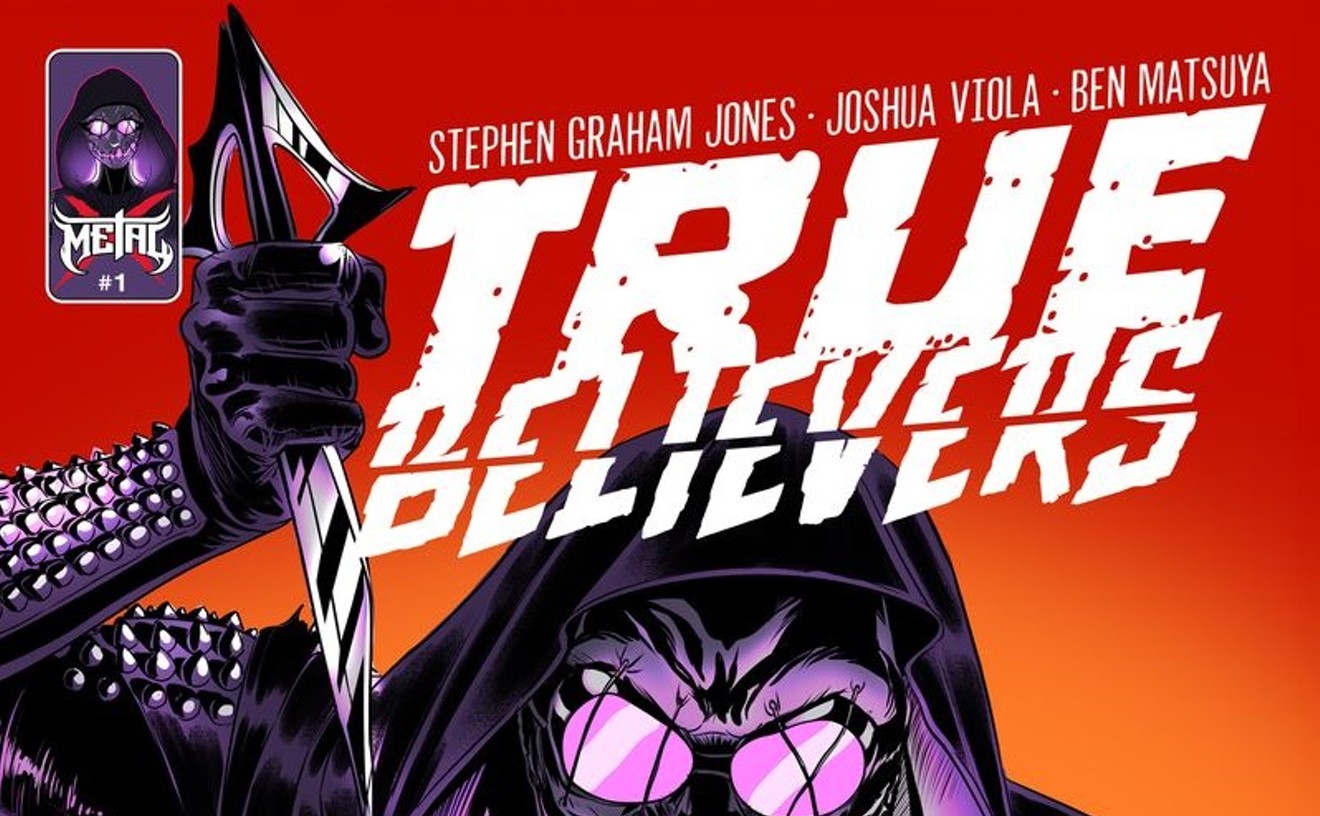Jesus Hates Me. Ethan lives with his religion-obsessed mother, Annie, in a trailer on a Jesus-themed golf course in rural Texas, where Jesus and his apostles are represented by appropriately dressed (or undressed) store dummies. The sheriff, Trane, is African-American and Ethan's best friend; he's on the hunt for the kidnapper of a little Vietnamese girl. There's also Lizzy, with whom Ethan once had sex; dopey Boone, who ends up in bed with Annie; and Georgie, who tried to kill himself during high school graduation and now -- in one of the script's truly inspired bits -- speaks through a voice box in a strange, low-pitched, mechanized tone that never fails to get a laugh. Parts of the play, now in a world premiere at the Denver Center Theatre Company, are very funny. Other moments sound soggy and Hollywoodish, too sitcom-sincere for the would-be outrageous setting. The action lurches from the rollicking hijinks of the twenty-somethings to the closet scene from Hamlet -- son accusing mother, mother accusing son, incestuous overtones. It's hard to care about the characters, and there's something seriously wrong when the protagonist is feeling more pity for himself than you can muster up for him. Presented through March 11 at the Ricketson Theatre, Denver Performing Arts Complex, 303-893-4100, www.denvercenter.org. Reviewed January 26.
The King and I. Some of the problems with this production are inherent in the show itself. With its emphasis on strong women and abhorrence of anything resembling slavery, The King and I was progressive for its time, but no artist can entirely escape the myths and preconceptions of his own culture. So Rodgers and Hammerstein showed the people of Thailand as caricatures -- the women seductive and giggly, the men stiff as cardboard cutouts. The King -- in some ways and on his own terms a wonderfully humorous and quixotic character -- is still in need of civilizing. And who best to do it but a white, upper-class Englishwoman? The songs endure. No one ever wrote better love songs than Rodgers and Hammerstein. Shelly Cox-Robie makes Anna charming and radiant, and her voice is sweet and pure. Wayne Kennedy does sterling service as the King, though he makes the character funny and cuddly; there's no hint here of the dangerous, mercurial figure we expect, and that would jolt the plot into life. Presented by Boulder's Dinner Theatre through March 26, 5501 Arapahoe Avenue, Boulder, 303-449-6000, www.theatreinboulder.com. Reviewed November 10.
The Man Himself. The setting is simple: a white chair dead center, a set of coveralls suspended from a hanger to its right, a table holding sound equipment to its left. A man putters quietly around the stage while bouncy tunes fill the air: "What the World Needs Now," "You've Got a Friend" and "I Got You, Babe." The coveralls and the tunes are connected: Michael, the puttering man, works for a corporation called Component and Supply Incorporated Electrical Supplies, which is also the creator of Happitunes supermarket and elevator music. He's a stickler for procedure, and his co-workers dislike him for it. Eventually we learn a little about his childhood, his non-believer father and the mother who made him take Communion. Some of his lines are particularly telling: "I am only doing what I am told"; "Compassion has nothing to do with it. There are rules." Michael is troubled by Latino hoodlums and the Muslim couple in his apartment building, who drink beer and play loud Arabic rap music. He dislikes unions. In an increasingly demanding and multicultural world, he's unable to find his footing. But he does have a friend, Richard, an evangelical Lutheran who slipped a flier beneath his door one evening. The Man Himself was written by Alan Drury, an Englishman, as a study of how an ordinary person becomes drawn to fascism. Israeli actor and director Ami Dayan has adapted the text with Drury's permission, setting it in Denver and substituting contemporary American evangelism for fascism, and he gives a riveting and intensely authoritative performance as Michael. Presented through March 18 at the Boulder Museum of Contemporary Art, 1750 13th Street, Boulder, 303-443-2122, www.bmoca.org. Reviewed August 25, 2005.
Mother Courage and Her Children. Bertolt Brecht wrote Mother Courage, one of his most famous plays, in 1939, as a warning to Scandinavian countries of the inexorable forward motion of Hitler's killing machine. It's set in seventeenth-century Europe during the thirty-year war, and Mother Courage is an ambiguous and ironically named figure, a peddler who pulls her cart through war-torn lands. She symbolizes capitalism but also embodies war itself -- both its stupidity and the suffering it causes, including the loss of her three children. Brecht is famous for his theories about audience alienation; he wanted his plays to inspire analytic thought rather than empathy. Yet at the climax of the play, Mother Courage's daughter, Kattrin, breaks out of the general moral paralysis to perform an act of astonishing heroism. Mute throughout the action, she makes a huge and sudden noise, sounding the warning Brecht that intended for a sleeping Europe: Wake up. Defend yourself. The enemy is at the gate. Under the direction of Eric Prince, the company performs with conviction and integrity. Presented by Bas Bleu through April 1, 401 Pine Street, Fort Collins, 1-970-498-8949, www.basbleu.org. Reviewed March 2.
Party of 1. This is a good play to go to with a date, or to attend in hopes of finding one. The show is a sequence of cabaret songs dedicated to the joys and pains of singlehood, slightly reminiscent of I Love You, You're Perfect, Now Change, though without the monologues; fizzier and more light-hearted than Sex and the City, but less weighted with ego and pretension. Four appealing people spin through songs with topics ranging from the insecurities raised by meet-and-mingle functions to the intense ambivalence you feel when someone with whom you're having a great relationship actually takes the next step and moves into your apartment. Party of 1 ran forever in the Bay Area, where writer-composer Morris Bobrow is famed for his clever lyrics and bright, listenable tunes. Good-natured and enjoyable, with just an edge of grown-up irony, the show deserves its popularity. Presented by the Playwright Theatre in an open-ended run, 2119 East 17th Avenue, 303-499-0383, www.playwrighttheatre.com. Reviewed November 17.
Red Scare. This is a hit-and-miss proposition, with mildly amusing moments alternating with laugh-yourself-silly skits and a few out-and-out clunkers. There's nothing particularly sophisticated, surprising or cutting-edge about the renowned Second City's Red Scare, but there is some funny stuff. In one scene, a teacher in a rough school comes into her classroom after hours to find a student planning to rifle her purse -- but in the end, he tells her in song, he couldn't steal from her because "I Saw Your Paycheck." In another, a suicidal Shakespearean heroine is talked out of her despair by a sassy gay friend. There's a good sketch about the exaggerated way white people talk to their black co-workers; a sad-funny bit involving a coach and his cancer-stricken wife; a monologue in which the talented Amber Ruffin gives grandmotherly advice about marriage and childbirth. Presented by Denver Center Attractions through May 21, Garner Galleria Theatre, Denver Performing Arts Complex, 303-893-4100, www.denvercenter.org. Reviewed February 16.
The Smell of the Kill. Nicky, Molly and Debra are thrown together once a month because their husbands are friends. On this particular occasion, they cluster in the kitchen of Nicky's million-dollar home while the men practice their golf putts in the living room. The women don't particularly like each other at the beginning of the play and they're the closest friends imaginable by the end, so you could call this a female-bonding drama. Except that there's no hugging, and nary a tear in sight. And the bonding arises from a prolonged and far-from-theoretical debate about whether the women's husbands should be allowed to stay alive. Perhaps it should be troubling that by the play's end we're all rooting for a triple homicide, but how can an evening that provides so much malicious fun be wrong? Presented by the Avenue Theater through March 18, 417 East 17th Avenue, 303-321-5925, www.avenuetheater.com. Reviewed February 23.










